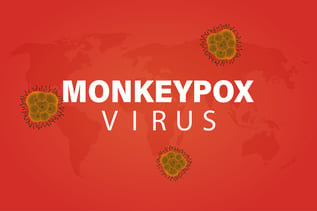
Things you should know about the Monkey Pox vaccine.
There are two licensed and approved Monkey Pox vaccines currently being administered. The vaccines are for the prevention NOT the treatment of Monkey Pox Virus.
One is JYNNEOS (Imvamune or Imavanex) which is in limited supply in the U.S. the other is ACAM2000 and is in larger supply. The CDC recommends that the vaccine be given within 4 days of exposure for the best chance to prevent onset of illness. If given between day 4 and 14 after the date of exposure, vaccination may reduce the symptoms of disease, but it may prevent the disease.
More about the vaccines:
JYNNEOS contains a live vaccinia virus that does not replicate efficiently in human cells. It is administered as two (0.5 mL) subcutaneous injections 28 days apart. Immune response takes 14 days after the second dose for maximal development. This vaccine is currently only being administered to persons 18 and older. The CDC is developing an Expanded Access Investigational New Drug IND protocol to allow broader use of JYNNEOS in the pediatric population. Adverse reactions to JYNNEOS included injection site reactions such as pain, swelling and redness. The most common systemic reactions were fatigue, headache and muscle pain observed after a JYNNEOS clinical trial. JYNNEOS is safe to administer to people with HIV, eczema and other skin conditions unlike ACAM2000. JYNNEOS contains small amounts of gentamicin and ciprofloxacin and is produced using chicken embryo fibroblast cells. (People who have had a severe allergic reaction to chicken or egg protein and are currently avoiding all chicken and egg products have a precaution for receiving JYNNEOS vaccine and should be informed about the potential for increased risk of allergic reaction if vaccine is administered. They recommend a 30-minute observation period after the person is vaccinated.
ACAM2000 contains a live vaccinia virus THAT IS replication competent. This vaccine is administered as one percutaneous dose via a multiple puncture technique with a bifurcated needle. A lesion known as a “take” will develop at the injection site which may take up to 6 weeks to heal. Immune response takes 4 weeks for maximal development. ACAM2000 is licensed by the FDA for use against smallpox not Monkey Pox; however, is allowed for use against Monkey Pox under an Expanded Access protocol. ** Informed consent should be given at time of vaccination.
Adverse reactions after ACAM2000 include injection site pain, redness, fever, rash, lymph node swelling and complications from inadvertent inoculation. About 1 in every 175 people who received this vaccine developed myocarditis for the first time.
Those with severe allergy to injection ingredients should not receive the vaccine, however a list of ingredients is not listed on the CDC website. Among those who should not receive it are those with severely weakened immune systems. Congenital or acquired immune deficiency disorders including those taking immunosuppressive medications and people living with HIV regardless of immune status. People with eczema, psoriasis, other exfoliative skin conditions and people with history of eczema and exfoliative skin conditions. Additionally, people should avoid this vaccine if they are pregnant (JYNNEOS deemed safe during pregnancy), have cardiac disease and/or eye disease treated with topical steroids.
Other information regarding the vaccines.
A person who contracts Monkey Pox virus after their first dose of JYNNEOS is not recommended to receive a second dose; however, a person who is immunocompromised may be eligible to receive the second dose on a case by case basis. Nor should anyone who has already been diagnosed with Monkey Pox during the outbreak beginning on May 17,2022.
Lastly, adverse events following ACAM2000, including myocarditis and or pericarditis or Vaccinia virus transmission to household contacts CAN BE SERIOUS. (It is in the water, diapers, swimming pools, etc.) To avoid the spread of Vaccinia virus transmission to others or other parts of the body, recipients should be advised to keep the vaccination site covered and to avoid swimming, sharing of blankets and towels and contact with people who might be at a serious risk for adverse events such as people with weakened immune systems, people with eczema and other exfoliative skin conditions, children younger than 12 months and people who are pregnant.
Vaccination given after the onset of signs or symptoms of Monkey Pox is not expected to provide benefit.
Who should get the monkey pox vaccines? If you have certain risk factors (unprotected intimacy and/or multiple partners) you are more likely to be exposed to the virus. When coupled with the vaccine, self- isolation and other prevention measures when symptoms being may help to slow the spread of the disease. It is important to note that no data is available yet on the effectiveness of these vaccines on the current outbreak.
*** This is not an opinion article. All information comes directly from the CDC website.
https://www.cdc.gov/poxvirus/monkeypox/index.html
Are you worried about Monkey Pox?
We can strengthen your immune system by utilizing immune stimulating protocols. We can individualize your formula whether you have had Monkey Pox, are vaccinated for Monkey Pox or worried about Monkey Pox.
If you are worried about any post vaccine effects or myocarditis (heart inflammation) we have formulas to support your better health.
We combine ozone, glutathione and additional cardiac protection to deliver your best protection and detox.


